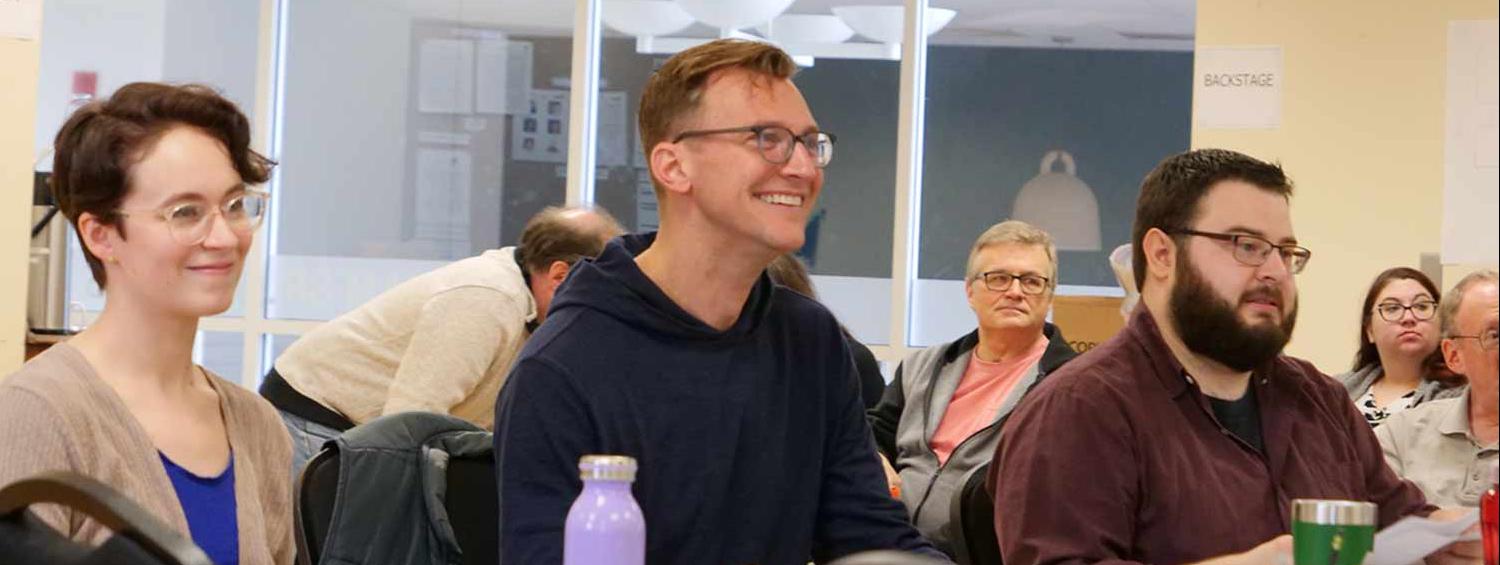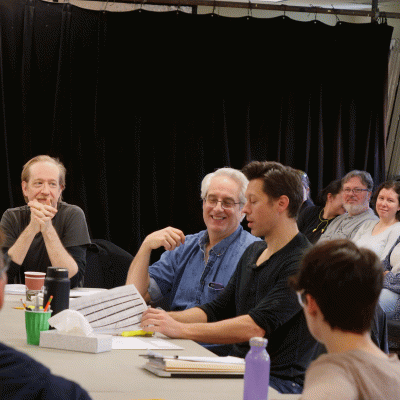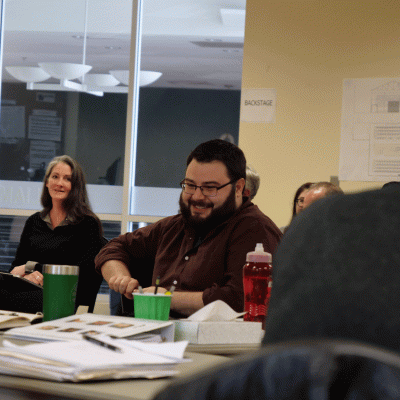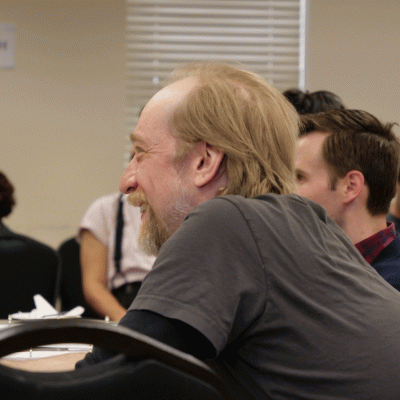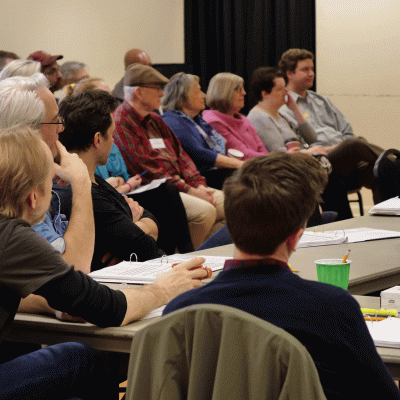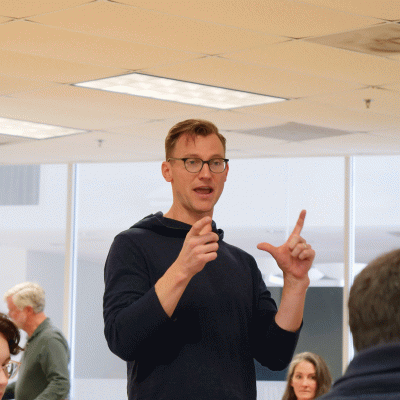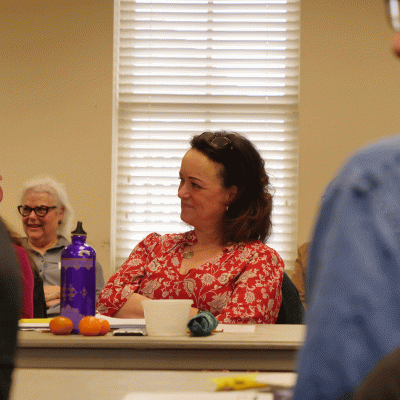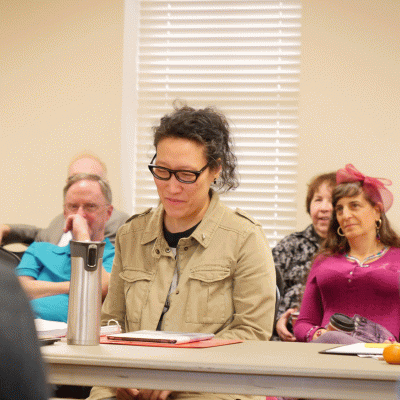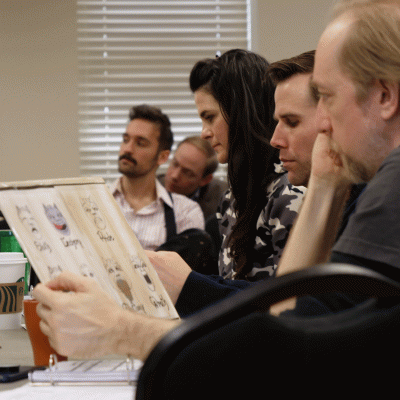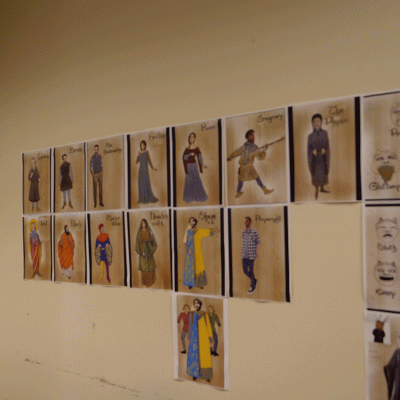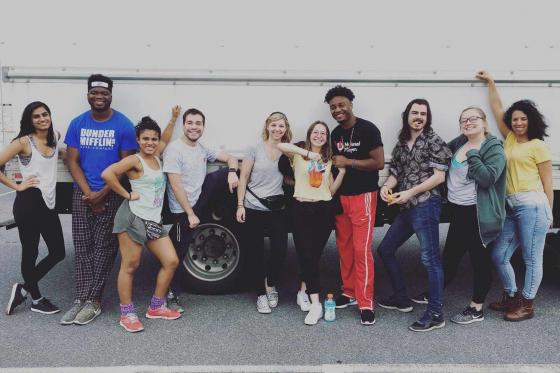OTC’s upcoming production of The Amateurs by Jordan Harrison began rehearsals this week. Sarah Kiker, Dramaturgy Apprentice, sat down with director Jason King Jones (OTC’s Senior Associate Artistic Director) to talk about what The Amateurs is and why OTC decided to produce it this season.
This might be a difficult question to answer for this play, but, generally, what is The Amateurs about?
The Amateurs is about a lot of things. It asks the question: “Why do we do art in a time of crisis?” and “What’s the importance of artistic expression at times of crisis?”
The play parallels three distinct moments in our history when we thought our humanity might not exist beyond. The first one is the story of Noah’s Flood, which is the first time in the Abrahamic tradition that Earth’s population was wiped out except for the people that God told to go onto the ark. He destroyed the entire population because of the sinfulness of man.
Harrsion parallels that with a 14th-century European company of actors who are engaged in telling that story of Noah’s Flood and trying to escape the Black Death. In some places, this plague wiped out 70 percent of the population or killed off so many people that the villages didn’t exist afterwards. It’s a moment where death was so present that people didn’t see hope beyond it.
As we go deeper into the play, the third event that we’re asked to consider is the AIDS epidemic in the 80s and 90s that, especially for the gay community of which Jordan Harrison grew to become a part of, felt as though it was taking everyone with a sense of arbitrariness.
Besides those three events, the play focuses on a kind of survivors guilt. The actors that we see telling the story of Noah’s Flood lose one of their own—a brother to the character Hollis. Question immediately spring up of “Why are we okay to be alive when Henry died?” That kind of survivor's guilt tracks through the play as a major theme of the show.
The story also follows Hollis, who plays Noah’s Wife. Noah’s Wife refuses to get on the ark, initially and Hollis begins to ask why? Is it simply because of what she says, or because its funny and there’s some comedic relief in having a shrewish wife character fight and bite and claw to stay off the ark, or is there some deeper reason? Maybe she doesn’t believe that this flood is going to wipe everyone out. She really starts to deeply question the assumption that God is right and going to protect them. That gets into this kind of individualism which the play digs into in some unexpected ways.
So it’s a couple of layers. There’s a layer about a group of actors in 14th century Europe struggling to put on Noah’s Flood while also trying to escape the Black Death. And then there’s a layer of “What does it mean to be doing art in a time of crisis?” And then there’s a layer of survivor's guilt. The play asks the audience to experience the story on one layer and then reveals some other layers in the second act. It asks the audience to see the play through this multi-layered prism.
How did you first come across The Amateurs?
I first read about The Amateurs in a New York Times review. Obviously I knew about Harrison because we had produced Marjorie Prime here a couple of years ago. I was intrigued to read about Jordan’s latest play and when I learned that it was about a group of traveling actors in Medieval Europe, I got really excited about the thought of our theatre potentially being able to do it. I emailed Jason Loewith pretty quickly and he emailed me back saying, “I have a copy of the script. You should read it and let's talk.” Which I did. I was totally excited about it because I run a touring company, I dig classical theatre, and I love theatre history. I also just love the themes of this play.
In the Fall of 2018, we had a day-long internal showcase of seven plays that we were considering for the 19/20 season. I had an hour to pitch The Amateurs. I selected some scenes, got some OTC folks to read the roles, and we put those scenes in front of our team. Everyone got excited about the play. They agreed it's an interesting piece and it’s something that our audiences, particularly our audiences who love news plays, would really be jazzed by.
Since I’ve been here (I started here in the fall of 2012) I’ve directed a number of shows for National Players and I’ve directed a number of shows for Olney, but this is my first show for OTC that I pitched and we’re doing. I’ve been assigned a lot of plays, but this is the first one that I said, “please let us do this and let me direct it” and that’s happening. It’s also my first time directing in The Lab. I’ve directed all of my shows on The Main Stage and I’ve directed a ton of shows that started on The Historic Stage and gone on the road with the players, but this is the first time I get to direct a show in The Lab, and I’m really excited about it.
What makes you want to share this story?
The Amateurs has all of these layers of complication, but to me it feels really simple. It’s a story of people compelled to do their art and who are just struggling to get by under extraordinary circumstances. At that level, I feel deeply connected to it. The play wrestles with big themes, but ultimately it's about how we make a community together despite the hardships that surround us. That feels really personal to me, having been a freelance artist for a long time and trying to raise a family in the world of theatre. It relates to me at a really human level.
There’s also some hope in it. Despite any cynicism that I might have, I am an optimist at heart and there is some beauty in the world despite all the ugliness and crisis that may be surrounding us. I see this play as a gift to share with our audiences.
There is also something fun about digging into the question of “How did people engage in the making of theatre 700 years ago?” There’s some kind of joy in watching these people struggle to tell a story within their limitations. Audiences so often only see the finished product and this play is a play about the struggle to get there. I’m a person who really loves process and this play is about that too.
Anything else you want to add?
It’s a comedy. The press release calls it a dark comedy, I call it a hopeful comedy in a dark time.
Below are pictures from the first rehearsal and meet and greet with the cast and production team.
Box Office: 301.924.3400
Open Wednesday - Sunday: 12:00 PM - 6:00 PM
Save 15% on Weeknight Performances
Use the code WEBSITE15 at checkout to save 15% on Wednesday, Thursday, and Friday night performances of Hello, Dolly! through January 2*.
*All sales final. Not valid on previously purchased tickets. Cannot be combined with any other offer. Limit 4 tickets per household. 1 order per household. Only valid on weeknight performances of Hello, Dolly! through December 19. Offer valid while supplies last.
Purchase Now